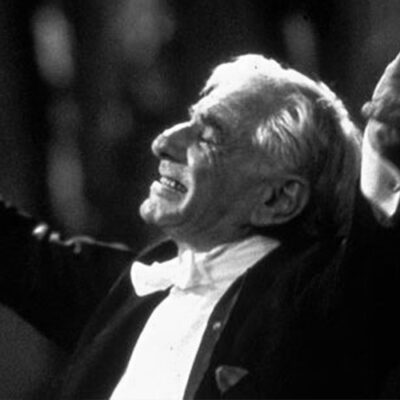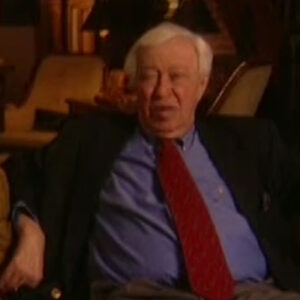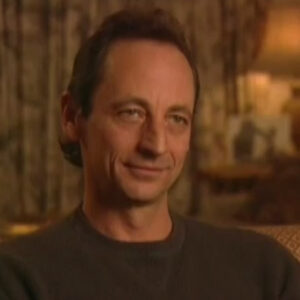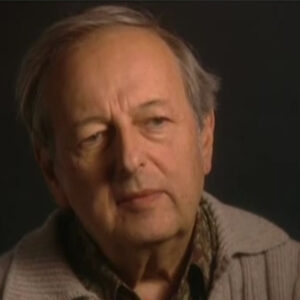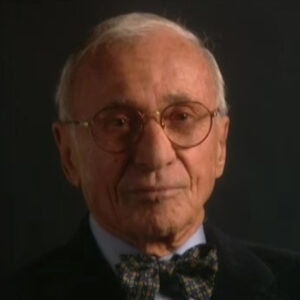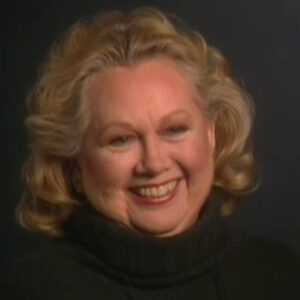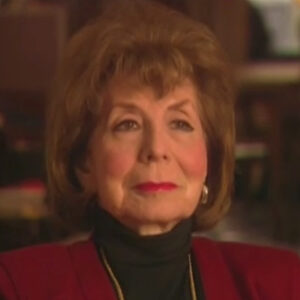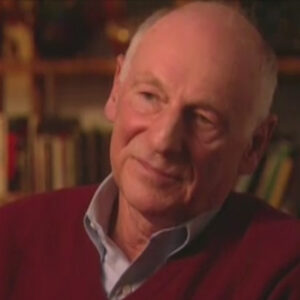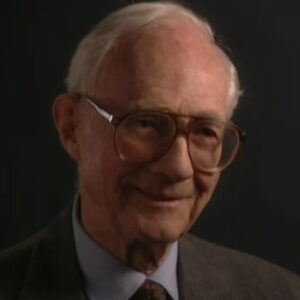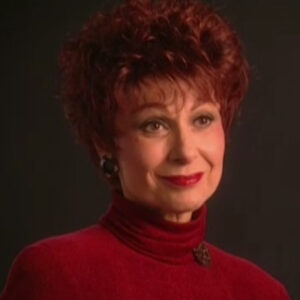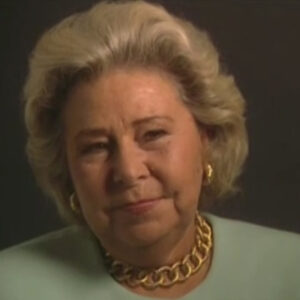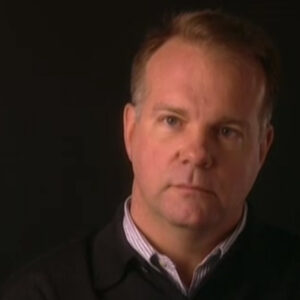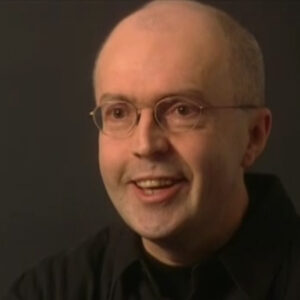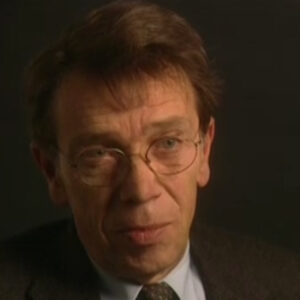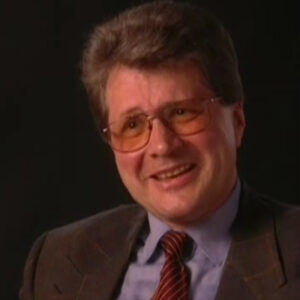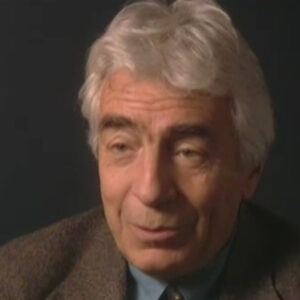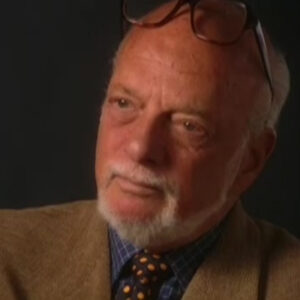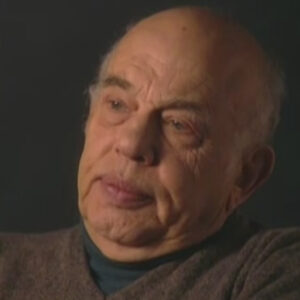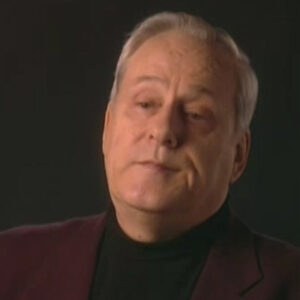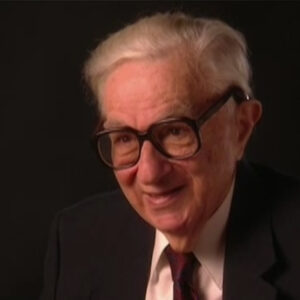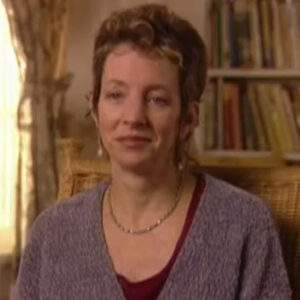Speaker I think it’d be a good idea for starting your first exposure to.
Speaker Now, when I’m talking to you, I can use your name once in a while to. That’s OK. No, not your name.
Speaker OK, ok. OK. But yeah. Right. OK, let’s talk about the Young People’s Constitution. Was that your first exposure to them?
Speaker Like I was a young child, I mean young growing up in rural Indiana. And the first exposure I had to the great Leonard Bernstein was on the young people’s concerts that he broadcast and the omnibus shows as well. And when I say impact, I don’t know. The word just doesn’t even have enough meaning. It’s just the impact was was was astounding on me when he had the orchestra play the the first measures of Beethoven’s Fifth Symphony and then he would wheel around. I remember I have maybe this fantasy now. I haven’t seen it since then. It’s fantasy that you all know what that is. It’s Beethoven’s Fifth. Well, we’re going to change it. We’re going to and we’re going to see how it was written, how it was put together. I mean, it was it was almost as if I you know, you’re sitting in your chair and you had 150 mile an hour wind blast you.
Speaker I was at that time, maybe I was, I don’t know, late fifties, maybe ten by that time and not even. And I had started playing the piano and and music had gripped me, the power of it. But to see somebody on the on the at that time infant television.
Speaker To take that kind of music that I thought was was powerful down, but I didn’t know what to do with it, my piano teachers were everything was was in miniature, you know, was learning little scales or something. And then here’s somebody who has the power of the Sistine Chapel or something is just taking it’s like watching Michelangelo work or watching Beethoven work. And in fact, that was the thread that pulled me to Lenny all along through the rest of his life. And my contact with him was that it was almost as if he was writing the music as he was performing the well that elaborate on that because and he called it great composing and quite criticized for that remark, that you had your own interpretation with your character that, oh, look, in the acting world, right. I mean, is an actor an actor, unless the person can embody the role. I mean, do we expect a dispassionate reading of a role from an actor? Well, why from a musician? Why I didn’t doesn’t make sense to me. It only makes sense the way the way Lenny did it, which was to throw himself head foot heals everything he had into a piece with no holds barred. And if you make a few mistakes, OK, but the risk, the the passion is there. The passion was there. And that made total sense to me. And it was I must tell you, you know, watching the young people’s concerts as a child from distant rural Indiana and then coming, I mean, what a what a the culmination of a dream to actually come to New York and play those young people’s consciousness and see how they were put together behind the screen. That was just incredible. And I realized how much work went into those white pieces, as we call them. I thought he just sort of got up there and started talking about music and he gestured back and the orchestra would play and tubas after Letterkenny or something. Well, no, it was I mean, we got up practically at dawn and rehearsed several days before. And he was Roger Englander and his other wonderful staff had been doping the script out and God knows how long before. And even at the point of of the of the first rehearsals, I could just see how the processed work of putting this thing together. And then making it seem spontaneous, it was to me that that just made me doubly in awe of the whole process as well as any symphonic performance. I mean, you see the first rehearsal of a new piece, something you don’t know what the heck’s going on. Everyone’s sticking out. There’s always sticking out of flutes. And it’s almost as if the instruments are, you know, not not assembled properly. And then somehow the whole thing gets put together with with Lenny.
Speaker Every piece was like that. It’s almost as if he started from scratch. So one of my crowning moments with him, I mean, it just brought me to tears right in the middle of the rehearsal. How many times is that man played Tchaikovsky’s Fourth Symphony?
Speaker I mean, the finale, that cliched finale and that they were all playing this 100, 150 times. He comes on and he has obviously not been sleeping the night before, comes a few minutes later. This is characteristic to the morning rehearsal. Everything doesn’t start until, you know, 10 minutes later, something he puts down the baton. And he said he said, you know, I’ve rethought this entire work. Everything I’ve ever thought about this work is wrong. I’m going to do it all over from scratch. Now, look, you guys are going to do here. And instead of doing this, let’s enter like that. And don’t you know.
Speaker And it was just I was just I don’t know something about that moment, because having worked with him now at that point for almost 20 years, for him to come with that fresh. An approach to what we like to call a war horse, you know, a standard work, I mean, that’s just, you know, well, I’m in the right place. It’s all I could say.
Speaker And how was that interpretation, by the way?
Speaker Usually when Lenny performed the piece, he wasn’t happy with it until half the less half the audience was in tears, too, especially if it was something like Czajkowski. And at that performance, yes, absolutely. It was just it lifted you off your seat. And that’s sounds like a cliche, but I mean, when you actually see your rear end lifting off the seat, then you say, oh, this is not a cliche. This is actually happening.
Speaker You know, this work is living. This is not some museum piece we have here. So don’t get me started on that, because that’s what this that’s what this whole business needs, you know, some of this kind of passionate new life, you know, that that is created of the moment. Otherwise, you know, we could we could rely on recordings the rest of our lives and who needs you know, who needs a live performance. Just a lot of trouble. The parking, the, you know, getting dressed, the whole business and sitting next to the guy coughing, you know, next to you, you know, otherwise, why bother? You know, so that was that that was the moment. The moment. And you were there. You were there. That’s what made it worth the whole the whole studying and practicing and putting up with this and that, you know, it it made it worth it.
Speaker How did Lenny communicate his desires to you?
Speaker When I first joined the Philharmonic, which was in 1969, just as he was leaving as music director, of course, he stayed with us until the end, bitter, glorious end. When he first came, I found it hard to follow his beat.
Speaker Because the beat went by the phrase and the flow and the and going from here to there, there wasn’t this kind of Four-Square thing that we were often used to with a lot of conductors. So I found it hard to to stay together. So how is this band staying together? I mean, who are they? You know, what are they falling? And then gradually you get into the into the field of the phrase, you know, you can you can see the motion start from here and, you know, it’s going to go to there. So you extrapolate, is that the right word? Maybe you said, OK, we’re going to go to there. I’m going to arrive about then and then you get a feel for it. And then it’s a much more, much more real phrase. You go from here to here rather than, OK, you know, we have these stop off points like, OK, at eight, 13, we’re going to be at the Scarsdale Station at eight, 14 is Croton. And whatever you have this feeling of of taking a long journey from here to there and the phrase kind of. Flows and sings more, just like the kind of breath that I’m using right now, there’s more of a I won’t say spontaneous because I’m as I said before, there’s a spontaneity, but it’s an apparent spontaneity. It’s all planned out. But it’s it’s got to it’s got to flow from here to there, like you would practice, align and act or practice alone over and over again until you live that line. And tomorrow you may you may say, you know, I’ve caught you with my wife in the next day. I’ve caught you with my wife. And both times it’s just a sincere and just as practiced. But it’s different. It’s different each time. So why shouldn’t a symphony be that way? It is, as a matter of fact, do all be all right.
Speaker Do you think most of the musicians share this view or whether some musicians who thought that Lenny’s varying and wildly varying and diverse interpretations were sort of difficult? I mean, you know, some people I mean, I’m always curious. I told you and the first person has actually been able to to address this because like I asked the same question, music is such an emotional experience. Why was criticized for being so emotional, but are there musicians who want to kind of know what to expect each other as they come onto the stage?
Speaker Lenny produced and brought out in all of us such a complex of emotions.
Speaker I think all of us loved him. All of us hated him at times. All of us were mystified. I, for one, for sure was scared of him. The first couple of years, I was almost frightened of this of this fanatic seeming person who just wouldn’t give up until he got what he wanted. And and sometimes it was unpredictable. His temper, his fits of temper was unpredictable to me at first until I began to understand the rhythm of them. OK, look, all the musicians had this, and I can tell you this for a fact.
Speaker Unless somebody wants to sue me, I think all the musicians had a big place in their heart where they loved Lenny, which they did not have for any other conductor that I know of. Certainly at that time, they we all were irritated at certain things, you know, when he wouldn’t show up on time for rehearsal and then make us go overtime without that being planned.
Speaker OK, I mean, you can’t argue with that. That’s that’s an irritation, but that’s an irritation on one level. And I hope to God people don’t remember the Philharmonic for that. I mean, that’s ridiculous. That’s like complaining that there are roaches in your hotel room. It’s not focusing on the other thing that you’re there for. OK, everybody complains this is New York, right? Do we complain about the mayor, the garbage collectors, the baseball team? Is there anybody that we don’t complain about in New York? OK, so suffice it to say, we’re going to complain about Lenny. Lenny is going to complain about us.
Speaker OK, and I thought, well, maybe Lenny doesn’t really love us because there were some times when he went and he made this favorite recording with Vienna, or he’d come back and he’d say, this kind of nice thing about Vienna. And you’d you’d be like, maybe that was like, what do you call that sibling rivalry or something? Oh, well, you like you like my older brother better than me, you know, I’m going to go and hide in a corner or something. And there was a lot of emotional stuff like that, but. If you just were patient and during that same rehearsal, you would see the love come out. You really would, and we all we all knew that we all knew to wait for it, and we knew that there was going to be emotions back and forth. But I swear to this very day, and I will always that the overwhelming effect of that music making, it’s like begging the question to call it positive. I mean, it was just it was why we become musicians. That’s why we’ve become musicians to have that kind of insight into great art. And it helps, by the way, to to be a composer. OK, this famous thing that everyone says, well, Lenny was a composer, so he understood the mind of a composer. Well, it’s true. It really was true. And he was not anywhere near respected or accepted in the what do you call that pantheon, the academic pantheon as the composer that he was? It’s true. He didn’t produce nine. It was a 10, 10 symphonies, bang, bang, bang, bang, like Mahler did, alternating, you know, his summer activity with his winter activity and running across the Atlantic at that time would have been a big deal. But and as a matter of fact, that’s that’s kind of germane because Lenny always was in awe of Gustav Mahler. But for American music, he was absolutely every bit as big and maybe had a more far reaching influence in many ways. He didn’t allow himself the time to sit down and write the symphonies. But the symphony was not Leonard Bernstein. Leonard Bernstein was this wonderful. What’s the word I hate amalgam. I hate eclectic, I hate all those words. Lenny’s music brought itself together just as he brought himself together and just as we Americans bring ourselves together. Right. I mean, I walk out to my from my apartment on 19th and Broadway. What do I hear within 200 feet? 25 languages.
Speaker OK, Lenny was part of that that whole thing, I mean, he heard here the Haitians on the corner, he heard the Mexicans here, he heard the African-Americans there. He heard he heard the white upper class and the this and that and all kinds of near the old German tradition in there. Of course, he heard all the popular kinds of music.
Speaker And, you know, that’s that goes without saying he was in a position to bring all that together as no one since maybe Gershwin and even maybe in a God, I don’t know, maybe a more deep, dynamic way than Gershwin, because Lenny knew the symphony orchestra like nobody in the way he wrote for the symphony orchestra. But Lenny, like Copeland and William Schumann and some of our great American composers, I mean, look what happened. You know, criticism there. There are serious composers and there are entertainers. And it was customary at that time, I think, to almost.
Speaker Well, no one could push Lenny into a category, right, but they tried to push him into the category of popular music as an entertainer and therefore not as a serious artist.
Speaker I mean, I don’t know. I don’t I don’t even follow this reasoning. I love the symphony orchestra. And Lenny used the symphony orchestra. That was his voice. That was just it was his voice. And he pointed the way toward a new I mean, new dynamic use of that symphony orchestra. And we composers, because I spent every waking minute that I have not taking care of my children and playing the Philharmonic, writing music. I mean, you know, I know I know where that goes. He was on the verge of creating some some new voice for the symphony orchestra and actually had done that. And I think as a composer, his influence will be felt through the next century.
Speaker That’s so interesting because not enough. Not everyone shares that you now. Well, what do you mean when you say that? Well, what about it?
Speaker Do you think it will make its its effect last for the next century or what or what are some of the mechanics of Bernstein’s orchestration?
Speaker A European, even, you might say, Central Europeans sound from the strings, from the winds, from the brass, from the percussion. He hears the sound in the streets of New York City or Boston, I presume, but mostly New York City, because that’s where I live. And he also hears the, you know, the Broadway stuff coming up. He’s not really a Broadway composer. If you listen closely, it’s not Broadway music. Even The Candid Overture, which is quintessential Broadway, I suppose, the whole Candide opus. That’s not really Broadway.
Speaker That’s that’s that’s a.
Speaker I like I don’t think of these things in terms of words. There’s a there’s a certain sharpness of spice. I don’t know if I were a good cook, I would think of you think for you a good number of spices that he adds to spice anything.
Speaker Is that a word of the orchestral palette that we had not had before? Even it’s very different from Gershwin. Like I say, it’s different from Copland who spiced up his palette and his way and this kind of high treble sound, I think both mostly heard above Middle C for most of his career. For instance, I mean, that’s a overgeneralization.
Speaker Lenny had this this eccentric because his rhythms were always eccentric.
Speaker But very pointed, and I don’t think there was this almost hard edginess about the rhythm where he would you would be able to wash over with a soft kind of melody and sustain sounds. There was a Bernstine sound. It was there and it was new.
Speaker It isn’t him as a composer, try to describe to me what the elements are. I try to do things like that. Can you do I mean, what were the elements of Lenny’s composition that appeared over and over and over again that made people say, you can recognize Bernstine tune by the way they use this?
Speaker Well, I, I don’t I, I don’t know that I could describe it any more technically and verbally than that. And I’m not even fluent on the piano.
Speaker I can’t just run over the piano and say, well, he used this and he altered that chord there, whereas Prokofiev would have done this one of the of the most exciting things that Lenny always did with his with his own music, his own compositional music was to never stand still stylistically. And Lucas Fosse also does this as a composer, does it on a different level. He’ll heal. And I myself will just go over and within a space of a measure. Suddenly we’re on the Bowery or suddenly we’re in Russia. Suddenly we’re doing a rap tune or I’m speaking for myself. A Lennie’s was more. He would unify a composition a little bit more, but he would take the elements he would take like a seven eight rhythm was very important to him, not just, you know, pom pom pom pom pom. It would be tough.
Speaker And you should see him on the podium, you know, realizing his own works. I mean, it’s just he was constantly thinking it’s not good and it’s not being performed quite right.
Speaker What I have and then on another level, thinking the piece is not good enough, what I want to rewrite this or I want to do this over again or it’s not as great as Stravinsky or Copeland or something, you could just see those levels ticking off on him.
Speaker So in other words, maybe to answer your question, he would use techniques that other composers had used like, say, by tonality or atonality. In some cases, tone rose and so on, although he he remained pretty principled in his standing with the concept of tonality, he thought that this was what spoke to Americans and to musical people all over the world. And he, like many of us, was perplexed by the inevitable historical ness.
Speaker I mean, it’s almost like a religious or in a sense almost a Marxist. Look at this. He we were all under the sway, including Lenin himself, of this thing. OK, Mozart used so many non harmonic tones, you know, like could have a CEG. OK, now Beethoven would would would want if he would do a dominant seventh, he would CEG B flat. He would sometimes at a minor ninth. So you would have a you know, that kind of dissonance going on there. A list you said more non harmonic tones. So you get a little more dissonance. Right. Wagner used more, yet Schaumberg completely obliterated tonality and there was nothing but in a sense non harmonic tones, the whole the whole organization was was linear on a it was not grounded in tonality at all. It was grounded mathematically. And Boulez increased that mathematical quality by not just deciding mathematically what pitches to use, but what dynamics, dynamics, tone, color, meaning which instrument to use was all decided mathematically before. So we had this sort of inevitable thing, you know, because in 1945 it was like this. In 1910, it must be like that and so on. And we were puzzled, you know, what’s next? I mean, do we have not music at all? Do we have people or what was logical then? Is the machine going to take over?
Speaker Is a machine going to decide everything? Machine is going to play the music, listen to the music, write the music, copy the music, appreciate the music, criticize the music, and we’ll just go out and lie on the beach or something.
Speaker That was something I told Lenny that that was wrong, that there was a wrong turn there and that music did not necessarily reflect the complexity of nuclear physics.
Speaker Only, you know, in nuclear physics it was broadening so that the common person was nowhere near in touch with what was going on, molecular biology and a lot of the fields that required a lifetime of technology. Music was not like that necessarily.
Speaker Hey, music was about what we feel. And part of what we feel is mathematical, too, sure, and the language that I’m using is technical. But it flows out that this is the basis of it and that for Lenny, I mean, I’ll stand on that principle that for that for Bernstine was the basis of it. And that’s. You go out on a limb, say, but I think there was something about that that ran him afoul with those critics.
Speaker It was just too much heart and soul, and I love you, they didn’t believe it, I didn’t believe it at first when I came in the Philharmonic. Who is this guy? He comes in my first day at the Philharmonic. Right. Or when Bernstein was conducting comes in after an absence of a couple of months. Comes in, he puts his hand on the eighth stand of second violins because he comes in from the stage, right, right. Puts his hands, gives them a little tussle over the head.
Speaker You know, 716 here starts getting like that. Hey, Joe, how is the kids? How is the skiing season? How is this you know, how how was how’s your wife? How is all the new instrument you bought the new instrument. How’s that? How’s that sounding? Yeah, I mean, going by the time he’s reaching the first standard with Frank Galeano and David Nadie. And I think we’re in the first chair of the time. He was practically on the floor with these guys slobbering with kisses. And I said, who is this man? I’m coming from rural Indiana where we hardly kiss you, hardly kiss of your father. I mean, you know you know, your parents, my uncle. I mean, you know, we were embarrassed with body contact then in those days.
Speaker It’s crazy, you know, so it was all very puritanical. And so to see this all of a sudden, where is this coming from? It was a little shocking. And after a little while, then you realize, oh. It’s sincere, whatever else it is. It is utterly sincere. The guy really loves people, loves humanity, and there was nothing at all wrong with that. As a matter of fact, it woke people up. It warmed them up. And they they played like they played a lot better than they would have played otherwise, you know, woke him up. It was good. It was good stuff. So I think that that quality people who are more accustomed to viewing music and art from an intellectual only level, and I’m not saying one is bad and one is good, but only the intellectual level, as was the style then. Right in the 60s. That was the 50s. 60S. We all wanted to be intellectuals, and that’s that’s what he ran against a little bit of that current there.
Speaker What do you think of each other, of the composer conductor here? Because, I mean, did he ever talk to you about composing your work?
Speaker Yeah, he had. He heard he heard a work of mine. And this is later on in the 80s. And he was you know, I felt very complimented because he was quite taken with my stuff and began to show an interest in my work. So I feel very complimented in the last year, what turned out to be the last year of his life, I was writing a trumpet. Concertante was called The Legend of Spiting Divo. You know that that stormy stretch that separates Manhattan from the Bronx. It was an old legend of that. And I was writing the work from Marin Alsop, the young conductor, brilliant young conductor who was Lenny’s protege toward the end, in the style that I think Lenny would have liked.
Speaker I think Lenny would have loved to have narrated a piece, you know, orchestra play something, and then Anthony rose above the waves, you know, whatever, and and fit his voice in rhythmically.
Speaker So I was having Marin do that kind of thing. And we dedicated the piece to Lenny. And that was the week that he died. That was to that that he never got to hear it or even a tape or anything, but that was the spirit of his his.
Speaker I feel very encouraged by him here to talk to you about his own composition and his aides and his feelings about his work. How do you think he would have rated himself as a composer?
Speaker How would he have rated himself as a composer? I think he would have rated himself both. Extremely historically significant and probably a good part of them would have rated himself a failure. I think that’s to me was almost a tragedy because I can tell you that encouragement is so important to an artist in all levels. And Lenny needed that. He needed a lot of encouragement. All right. So what, you’re going to argue with that? So he needed encouragement, so, for God’s sake, give it to him. What he was doing was so great and so important. If he was acting like a little child here and there, he needed some attention. OK. All right. But produce. Yeah, he’ll produce. And he needed he got that attention as a conductor. OK, you got it. People were fawning on him, but as a composer, he needed more. And I, I always felt sad about that. He talked only with the greatest reluctance about his own work and not very much to me. He said how much he liked that he talked about the violence there and it went a little bit and he he was pleased with the work, as he should be. It is a great work, but he talked always very in very reserved tones. And when you would tell him how great you thought the piece was, you know, he wouldn’t really believe, you know.
Speaker You know, it’s like it’s like a shrink who’s telling you you’re OK, you’re OK. Don’t blame yourself. And then you don’t really believe that. You don’t really believe the doctor or the friend or the spouse or whoever is telling you. So it was a real to me, a real poignant thing toward the end of his life and I want to say that poor Lenny, OK, because he was, you know, obviously a quite a lionized, wealthy, incredibly educated person. But I think American music was very lucky to have somebody like that. And I think we in New York, I don’t know if I can identify myself as a New Yorker because part of me is still up in the Midwest and my parents were from East Europe. And so I don’t know. But anyway, we in New York didn’t appreciate him enough at the time when, you know, when we needed because he needed, you know, what he needed to do. He needed to bring that that stuff together from the West Side Story and from Candied and from the violin serenade and from the Jeremiah Symphony. And he needed to work with that the rest of his life. You know, you need to just mess around with that. Not that those words lack anything, for heaven’s sake. But he just I just have this image of him now, maybe maybe in this life, wherever he is, just messing around with those works, seeing what he could concoct and always with the performers view and mine, because it was maybe the biggest thing I learned from him as a composer was that the written page is not enough.
Speaker It can be right on page and still be a flop. In the performance and vice versa sometimes. I just had a premiere two days ago changing notes at the last last, last minute and very often taking advice from the performers. And now I’m going to change more notes. I mean, it’s just it’s not it’s not quite like sculpting in stone because it ain’t there and ain’t never there. And that’s why we still play this stuff. I mean, if Beethoven’s Fifth. That’s it. And that’s the end of it. Well, then let’s just listen to the 144 odd recordings we have and why should we bother to go into the concert hall? But it’s not there, it’s not there. It has to.
Speaker Well, the drama of an individual concert, I mean, is the same as the drama of a baseball player hitting a baseball out of the park. What a drama that is. Now, machine could do that a thousand times in a row. It could knock the cover off the ball, could do it much further than a human being could do. Why is it so interesting? Why do we stand in line and pay tickets for that? Because of the drama, the personal drama of that player hitting it. It was the same with Bernstine in a concert, no different. Why should it be any different? When Lenny did I remember on tour, we did the 1986, the Pathetic Sonata Patriotic Symphony of Tchaikovsky, the Sixth Symphony. He would turn around at the end and if the half the audience wasn’t in tears with him, including us, you know, the performers, he was unsatisfied. And what some people who would kind of step in at the end might say, oh, he’s milking the tempo in the last movement that Ultra said no, he was actually trying to grab you by the lapels to say, do you understand what suffering this man went through to write this symphony, what he was feeling? And doesn’t it resonate in you? Isn’t there some part in you that suffers that way? I mean, maybe if not, maybe not.
Speaker OK, then, you know, go home. But I want to connect with that part in you. And he was so concerned about that. I mean, what else is this about in the end? I mean, who knows about about the harmonic structure and even even myself? You know, I can tell you, you know, the ins and outs of sonata form, I could sit here for 12 hours and talk about that. But that’s not why even I listen to music. I try to I try to scrape away all that stuff when I listen, you know, what is the composer feeling? What are they feeling? What are the performers feeling that the composer is. We did, Francheska, the remaining ones, I remember.
Speaker And he was he was going on and on. And Stanley Drucker has this long, gorgeous clarinet line. And there’s he and Lenny was saying this is the longest melody ever written. Do you realize that? And he said it is if you just realized it. And by gum, you know, I’ve tried to do a little I’m not a scholar, but I’ve tried. I don’t I don’t know of any longer melodic line in that. But more important, even he was he became increasingly upset in that in that rehearsal. In fact, he even started crying a little in frustration because he said, you’re playing this music and it sounds great, but you don’t love it as much as I do. Why not?
Speaker We’re not doing it right and we’re going to get it right until until you guys feel the music, not just play the music. That was Lenny, that was his style of of approaching work to the very end, to the very last year. He was like that.
Speaker How do you think that, first of all, with your work under many other conductors, was this these things you’re describing about Lenny unique to Lenny?
Speaker I think Lenny went further than any conductor I can think of now in passionately recreating the music as if he himself were composing it at the moment, as if he himself were feeling it for the first time, falling in love for the first time.
Speaker There are many other wonderful conductors, and I wouldn’t even begin to start mentioning them because I’d leave out somebody’s name and a but it’s not that Lenny stood alone, but I do think that he went further in communicating his passions and his feelings and the depth of his understanding and feeling in a piece of music and being able to throw that out across the footlights, as it were, to the audience and reach the audience. I don’t think there’s any question about that. I do the orchestra to the orchestra as well. You know, like I said, there was there was some guys would grumble here and there about him. But let us not remember the grumbling, which was secondary. Those same people even who had grumble, they would be art in awe of certain performances. And how often do you get a job where periodically you’re moved to tears by the job? I mean, that’s what does that work that’s incalculable to me. I mean, it was especially toward the end, as it were, toward the you know, in the 80s, I began to not feel not necessarily feel the music even well, maybe feel the music more. But I began to appreciate it more, you know, like a teenager with with their wonderful, you know, physical mastery of life. You know, you’re young. You don’t appreciate you don’t appreciate being I was beginning to appreciate being young artistically with this man. And he was always young. Artistically wonderful statement.
Speaker I would think of that for a symphony orchestra player to the teacher would be very rare because, you know, it is a job, as you said. I mean, I would think that would be very rare. Wasn’t one of the things that Lenny did that was really unique was talk to the orchestra a lot like talk about the text I talk about. We really talk about what I mean wasn’t I mean, I’ve gathered from everything I’ve read that this was something unusual. Somebody said Toscanini would never talk. Right. What could you, you know, just say that that that that he. Yeah, he explicated the work, so to speak.
Speaker Lenny wouldn’t just come to a rehearsal, put the book down on the podium and start conducting very often. It would be important for him, always important, but very often he would actually talk to us about what the work mean meant to him. And this is not something which has fallen by the wayside. Conductors seem to be doing this more now. I enjoy it very much that Kurt Mazower takes it upon himself and he feels that it’s important that we understand the work and he will talk about what the work means to him. This is something maybe a previous generation of conductors did not do so much. Maybe it was because of orchestral resistance. Maybe it was because of critics resistance to the audience. Now, Bernstein always insisted on talking or communicating to the audience. He was finally beaten down. This is even before I joined the orchestra. He used to have these lectures and talk from the podium more. He was discouraged from this look. I mean, I’m talking subjectively now, right? I’m an individual. I love those times, OK? Often when a conductor talks, I mean, again, with Marin Alsop, who I was working with her, and she explained a little bit just before conducting Copeland’s third, a lot of that was learned from Lanita. And somebody in the audience afterward complained, Why are you telling me about the music? I just want to experience it. And I said to that person, I said. Well, wait a minute here, in those 40 seconds, I learned something about Kopans Third Symphony. Now, how much have I studied that work? Quite a bit, but I learned something I think the audience might have learned something to. I think it’s important for an audience to to have their minds opened a little bit. We tend to play what we like and what we know. And to open up a little bit is both a frightening and an exhilarating experience. And when I see an audience grasp something new, whether it’s a new interpretation of an old work or a new work. I see this joy on an audience face and say, hey, they’re getting their money’s worth, so let’s, for heaven’s sake, don’t stop us from giving it to them. And one of the ways that Lenny gave it to an audience was to say a few words.
Speaker So why not just talk a little bit about Lenny’s legacy in the sense of something we talked about with camera was not relevant.
Speaker I mean, some of the first of many that have changed music and changed the audience and changed the way people think about classical music, music, the role, the conductor, all of those things. And because I think, you know, it’s kind of important to kind of think about how we will think about Lenny 100 years from now and what that legacy really is not in terms of his compositions, but of his repertoire, his his style as a conductor. He did all of that.
Speaker And I see more and more the young conductors coming who mentioned in the biographies that they owe a debt to Leonard Bernstein. Let’s not worry whether they were Lenny’s favorite or whether they even worked with him for a terribly long time. Let’s remember the fact that they were touched by this guy and his influence on the style not only of American conductors. I see this in Europe as well. He was incredibly influential in Europe, maybe even during a certain period, more so in Europe than in America, sadly enough. But his influence upon conductors and therefore upon musicians, the style of music musicians, what musicians will play, what young musicians will practice in the conservatory to enable them to get a job is all of this is influenced in in a stepwise fashion by by Lenny’s presence, that that is part of his legacy. It goes so deep. There is a whole generation of us, myself definitely included, who grew up seeing him first on the tube, then in the concert hall. And then, of course, I’m lucky to have been on the stage with him. But first on the tube to see that that galvanized me. And I know there’s a whole generation of people vaguely my age who were galvanized by this. Hey, the symphony orchestra is something we can relate to. And I’m only nine, 12, 21 years old, whatever. I don’t have to be 45 years old and stuffy and wealthy enough, you know, to appreciate the symphony. This is my instrument. And I’ll tell you my legacy from Leonard Bernstein is this primarily it is to teach young children to write for the symphony orchestra, to put their passions and their doubts and their fears and their pet dog and their Aunt Matilda and their their trip to the to the mountains or the zoo to put that onto the symphony orchestra and to keep the orchestra instruments live and palpable and something that that the kids can work with. I work with as early as third graders to have them feel that the symphony orchestra instruments are theirs to work with, just as they would pick up a paintbrush that that is their paintbrush. And this is something I directly trace from Lenny’s idea of. Well, it was that thing when I was, I don’t know, 10 years old, and he turned around and said that was Beethoven’s Fifth we’re going to work with. We’re going to change it. We’re going to change the ending. That was that that said to me that work is alive, that’s not sitting out there, and it’s something you worship on an altar or something that works is alive, that wonderful work actually could belong to me, too. I could work with it. And that’s the that’s Lenny’s legacy. Now, as long as we keep that, the symphony orchestra will survive. But make no mistake, once the orchestra becomes set in its ways and you can’t add anything on to it, hey, that’s going to be coming at best, an early music group. It’s not going to become something living and breathing and growing. The symphony orchestra to me is the most magnificent artistic expression that humankind has ever attained to. And it still is. I mean, yeah, these are wooden instruments that were built in the 18th century and brass instruments that were built in the 19th century, more or less, but. The time doesn’t you know, it doesn’t have any relationship, just like my lungs don’t have time in my mind, lungs come from some, you know, and want to discuss evolution here. But how how old are my lungs? You know, my ears, my knees come back from from millions of years old. And it’s not affected by technology. They’re aided. And we can you know, technology can aid the symphony orchestra. And I think Lenny used technology, namely the television, to help the symphony orchestra. But the orchestra itself, that core that’s there, that’s there. That’s what we have. And I think that’s what Lenny kind of gave back to the people. It wasn’t something that belonged to some rich elitists. This is yours. This is your orchestra, and it’ll carry us into the next century as our voice.
Speaker Describe being in Berlin in 1989.
Speaker I think the occasion, you know, set the stage, I think for the rest of my life, I’ll remember the excitement that accompanied the the Berlin Wall coming down. Lenny was a part of that because he wanted to have an international orchestra play on both sides of that now crumbling wall. This was 1989. He chose a few players from from Russia, a few from Britain, a few from the United States, a few from Germany, a few from France in my leaving. And he flew from Italy, the major players in World War to the major nations and bringing them all together. This is, of course, a kind of vision that Lenny had and a good one. So we had an orchestra coming from both the at that time East and West Bloc coming together to play Beethoven’s Ninth. I mean, what better work could you have? And we played it on both sides of the wall and succeeding nights and. He did an audacious thing, he did Freud a got a funk and Freud, the word was joy for Beethoven. Me change again, like this thing about let’s change Beethoven and I think Ludvig would have approved wholeheartedly. I mean, as far as I’m concerned, he changed freude to Freiheit freedom. And some of us did that we are changing the text and especially the Germans, you know, what is this American coming over and changing the text of of Beethoven, of Schiller. But when we played it on the Eastern Bloc, you hear that same gasp when they heard that the the word Freiheit and what it meant to them and it was the right place at the right time. It was the right thing to do. And they remained in that in their in their seats. You know, when the phone of the fantastic flurrying and you always hear this Greek clapping and screaming and stuff for the performance. Total silence. That was a time when all of us, everyone was in tears. I mean, that was just we were just it had captured the spirit of the moment. And Lenny said afterward, I think, you know, at the reception, he said this is the most significant political event of my life and I’m just glad to have been a part of it.
Speaker You were something else. I would be surprised if there was so much joy, so much suffering, so much forgiveness and that many interpretations.
Speaker You should have heard that performance that we gave that that night. It was there was so much not just joy, but suffering and forgiveness in the same performance. It was it was a performance to remember all your life.
Speaker Do you have other musical highlights that like that, that stand out for you with Lenny?
Speaker I remember a. Richard Strauss wrote a. He’s thus spake Zarathustra and I had heard this piece a number of times and I didn’t like it all that much, and this is before the that film in 2001 came out. So it wasn’t a pop piece at that time. And there was there was one place when I came to the Philharmonic early on and Bernstine was saying.
Speaker There was this trumpet fanfare and then coming up from the depths we got into the to the high trumpets, the flutes, and everybody was trembling and then he said, you’ve got to come from here.
Speaker There was a bit was it a bassoon entrance, bassoon entrance comes up to the high trumpet and he said, you’ve got to you realize what Zarathustra is doing there. He’s leaping from the ground to the sky. Have you ever leaped to the sky? You know how huge that leap is. We’ve got to recreate that leap here. Oh, I just I just I almost couldn’t play. It was just something in the music that I had heard for so many years. It just came alive like that. When Lenny did that, he did that. He would do that to pieces at rehearsals or a concert.
Speaker And it was just, you know, that’s what you become a musician for, for sake. He moved here. Yeah, well, it was it was you know, it was just not just this, you know, learning something.
Speaker Well, it was just you could you could transpose an emotion, you know, like that, like a leaping like that. And you can then you can actually you could actually feel it. You can actually feel your heart yourself leaping. Even if you were like in a wheelchair or something, you could feel what it must be like to leap across from one cloud to another.
Speaker So that, you know, it’s not the only one who’s ever done that, you know, but but he sure did it damn well, you know, was there a difference between working with Lenny in preparation for a live performance and working with him in the recording studio? Yeah, let me think about that a second.
Speaker Yeah, we did a lot of recording sessions with him, of course, because we seemed like we recorded the whole repertoire and recording sessions were for me at that time. I was younger and we’d still be the same. I was very nervous in recording sessions because it was as if. You felt as if you made a mistake, you would cost Columbia Records an extra 5000 dollars, so a lot of us were on pins and needles. Lenny was more agitated and more more more critical during those sessions.
Speaker However, he, I think, endeavored to maintain his same artistic integrity by coming in late and taking time to get started emotionally so that the first half hour of the recording session, even though it may be, you know, the clock would be ticking. We would be kind of messing around artistically. We wouldn’t really get something down. Also, I noticed that his repertoire changed somewhat. He did the heightened symphonies, Joseph Haydn and Stravinsky, things which which might he got a little bit more meticulous and he listened more toward individual notes, it seemed during recording sessions. At least that’s my memory of it. And in the concert hall, it was more of a broad palette. He was conscious of shouting as an opera singer with to 4000 seats. But in the recording session, you would hear all these details coming in. It was kind of neat to see the difference in values. But like I say, I don’t think he lost sight of the big picture because he really he he took a while and getting started and and we’d go take after take. You know, it was just really it was grueling. The recording sessions were grueling, and then you’d see what would come out at the end. Sometimes it was great and sometimes sometimes it wasn’t. And we didn’t make it.
Speaker Do you what do you think? Your strengths and repertoire.
Speaker His strengths and repertoire will be kind of hard to pinpoint because they would change from year to year. I mean, obviously he had an affinity for Mahler. I mean, that’s the first thing anyone would say. And I would agree with that because there was this kind of restless suffering that was inherent in Mahler and this rich orchestral texture that many just loved to wade in and get his elbows into just that kind of texture that Mahler would achieve. And also emotional texture jumping from here, this memory of the Alps and then all of a sudden to some past event and then up to some big almost military thing and back and forth. And Lenny just he understood that. I mean, it was just like it was breakfast for him, but he also understood Tchaikovsky in that same way. He also understood Stravinsky rhythmically, he would have some troubles, he would have he would have to I mean, he even Rebadow some of the end of the rite of Spring.
Speaker So it would make it a little more toward the phrasing that he liked. However, his rhythmical sense was unassailable. So it was something that he worked on in a different level. It was a different part of his head. He did the American masters very well. He was the only one at that time, for heaven’s sake. I mean, who else did William Schumann and Aaron Copland like that? And Roy Harris, I mean, he he was he practically pulled him up out of obscurity at that time. So it was a whole American school that almost like was, you know, carrying on his back, as it were. So that was a huge strength of his repertoire. And he he did an enormous amount of what you might call avant garde of the 50s. And he ran afoul of that sometime because I’m a I’m a prodigy and a student of John Cage.
Speaker And he ran afoul of John Cage, not necessarily he and John, but the orchestra. And John didn’t work out so well in that famous incident, which I wish I were there.
Speaker But I know how it went because I knew a lot of the people involved described how much time we got, the minutes I lived eight minutes left to describe this. I don’t know.
Speaker Well, look, if you spend all your life practicing scales and practicing the Mendelssohn Violin Concerto and then someone asks you to shout into the Eiffel’s or to make a sound like that, like you’re breaking exactly as your teacher told you not to do. You’re going to rebel a little bit. OK. Hey, you know, Bernstine was about rebellion. The New York Philharmonic is about rebellion. New York City is about rebellion. So some of these guys rebelled and they and they and they acted up. All right. So so John Cage, John took offense and I guess he sort of had to because it was, you know, all the other composers being were being treated with with great respect.
Speaker And John was not what we needed.
Speaker There was an intermediary. I just wish I had been there. Because I wanted to put my arms around John and around some of the members of the orchestra and around Bernstein and said, look, this piece, Atlas Ecliptic is one of my favorite pieces of his because not because of, you know, the F sharp was tuned to the G flat here a little, you know, but because the piece Atlas Ecliptic callouses, there was a note. I mean, that’s an Atlas of the Stars.
Speaker And it gave me a feeling of infinity, this piece. OK, it had an artistic statement and I wanted it to be listen to. And it wasn’t listened to and it was kind of like the the the controversy in those days, precisely in those days between the hippies and the hard hats. I mean, what a what a tragic kind of confrontation that I mean, go into that scene.
Speaker Describe the how sort of Lennie’s glamour and how you think the orchestra responded to him as a glamorous celebrity, very much in the public eye. That was that part of Lenny. Was there a different and there was obviously a very different Lenny Williams in the pit, you know, working with you. How was that perceived or felt about by the musicians?
Speaker I can tell you personally that as much as I admired and loved and revered Lenny when we would step off the plane in Tokyo and and the sign would say, welcome Leonard Bernstein and then Barnum and tiny letters you could hardly read and New York Philharmonic, I would feel devalued. OK. I mean, that’s natural. All right, I got I’ve got an ego, I’m there. I’m putting my my whole thing. That was not anything necessarily that that anyone could do anything about. This guy was glamorous. He was incredibly glamorous. And I would look back on it, more power to him because we wouldn’t have been there without him. You know, there was some of that feeling and attitude mixed in, as I say, with the with the adulation. So it was all there in a mix. It was constantly a mix. And we were constantly in turmoil and and agitation as an orchestra. And I think it was incredibly healthy that that whole thing.
Speaker And we the orchestra members and I’m speaking as a member of the New York Philharmonic, we should have been strong and say, hey, we’re artists, we want to stand up for our art. We want to do something for Lenny, like just to take some leadership, do something different.
Speaker Don’t just sit there and play the notes and expect them to bow down to us, you know, take some leadership. And so they’re both sides of this question. And this goes in a long history. I mean, I’m very much involved was at that time very much involved in the history of the labor movements and how people’s peoples can get together and raise their own feeling and consciousness and take control of their own jobs. Just like I’m saying that Americans should take control of a symphony orchestra. This is our thing here. We’re not just going to sit back and watch the Masters play for us. I mean, there’s been statements very recently by some of our most respected writers that music is essentially an elitist art, which has been furthered by a few outrageously talented individuals or tremendously talented individuals, Mozart’s and and Leonard Bernstein’s. But I don’t think Lenny would agree with that. I don’t I think that all of us have an artist in us. And if we don’t well, in this art is not going to be very significant. I can tell you that. Yes, the are yeah, they are very significant, but the audience and the the the ground from which Mozart sprang is just as important.
Speaker Do you think that I mean it’s a long subject, but do you think that this is the democratization of classical music is something that is a lasting legacy of mankind?
Speaker It’s my opinion that when he stood for the democratization of music, I would just say it flat out. That’s my opinion. And I think that’s wonderful. If we didn’t have somebody like that. I don’t know where we’d be right now. And we need some more people like that to tell us that we are the part we are a part of this music, this creative process going on in.

